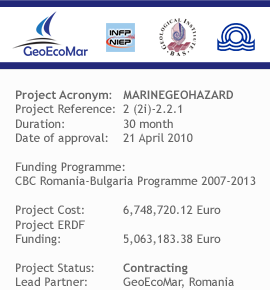Lead Partner
- National Institute of Marine Geology and Geoecology
www.geoecomar.ro
Romania Project Manager: Gheorghe OAIE (goaie@geoecomar.ro); Project Officer: Gyongyi RUZSA (gy.ruzsa@geoecomar.ro) The main activities of GeoEcoMar relate to: geological-geophysical-geoecological survey of the Black Sea as well as of other marine areas; study of natural hazards in Black Sea environment (submarine landslides, tsunamis, major storms, etc), environmental and geo-ecological studies regarding the ecosystems of the River Danube – Danube Delta – Black Sea; the environmental impact of artificial structures that are located along the Danube course and in the Danube Delta. GeoEcoMar has an up-to-date infrastructure for fluvial and sea research that include R/Vs “Mare Nigrum” and “Istros”, ROV “GEOS” and dedicated marine equipments and laboratories and is also operating a permanent wave characterization station located on the Black Sea coast, in Mangalia. GeoEcoMar has internationally recognized experts and participated in numerous projects aiming the development of regional capabilities. It also has an extensive practical experience in harmonization of strategies, procedures and methodologies at regional level, being involved in development and implementation of all regional plans related to the Black Sea environment (GEF/UNEP, Black Sea Initiative, etc).
Partners
- Geological Institute, Bulgarian Academy of Sciences (GI-BAS)
www.geology.bas.bg
Bulgaria GI-BAS is a research institutes that is actively involved in problems of the geological hazard and the sustainable development of the Balkan region. Participating in the monitoring of some active tectonic structures, as well as prognostic of hazardous geological processes (earthquakes, landslides, etc.) all over Europe, studies performed by GI-BAS are integrated with those of the EU member-countries. Having extensive experience in international and bilateral cooperation, the most recent study of GI-BAS “Seismic and hydrogeological vulnerability of the geoecology and the society in the Balkan region” resulted in innovative basic and applied research achievements that comprise: explanation of the paleogeographic circumstances during the Pliocene and the Pleistocene in the Danubian plain; and, a new concept concerning the geomorphology of the Danubian plain.
- Institute of Oceanology – Varna (IO-BAS)
www.io-bas.bg
Bulgaria The IO-BAS main field of expertise relate to: marine physics (marine hydrology, water circulation, currents, hydrophysical aspects of marine pollution, semi-enclosed and enclosed basins modeling – Black Sea, Caspian Sea, Mediterranean Sea); marine biology and ecology (phytoplankton, zooplankton, macrophytobenthos and zoobenthos, fish-stock assessment, biodiversity, response to environmental parameters – eutrophication and pollution); marine chemistry (monitoring and analysis of hydrochemical components in the sea, rivers and lakes, indicators of marine environment ecological state: nutrients, oxygen, suspended matter, POC, heavy metals in sea water and sediments); marine geology and archaeology (geological, geophysical and geo-chemical research, geological mapping, geomorphologic evolution and seabed processes, ancient sea coasts); ocean technologies (development and application of oceanographic instrumentation, specialized and precise devices, deep diving and hyperbaric systems, hydro- and geo-acoustics). - National Institute of Earth Physics
www.infp.ro
Romania The main activities of NIEP are related to seismic survey of Romania and operation of the national seismic network. NIEP has a wide background in Earth sciences research, with focus on seismic source and seismotectonics, seismic hazard assessment, site effects and microzonation, lithosphere structure and dynamics, earthquake prediction, assessment and mitigation of seismic risk. Also, NIEP has long-lasting experience in regional and global seismic studies and ensures Romania’s technical contribution to global seismological monitoring in support of the Comprehensive Nuclear-Test-Ban Treaty (CTBT). Given its demanding operational mission, the key objective of NIEP is the development of an advanced seismic data collection and management system, including robust real-time data acquisition techniques, reliable communications links, rapid processing and exchange of earthquake information, creating and handling of large data sets, compilation of bulletins and earthquake catalogues.



